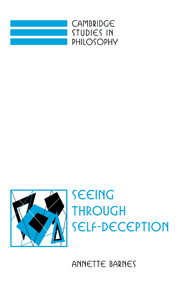Book contents
- Frontmatter
- Contents
- Acknowledgments
- Introduction
- 1 Other-deception
- 2 Two models of self-deception
- 3 The need for an alternative model of self-deception
- 4 Functioning to reduce an anxiety; satisfying a desire
- 5 Self-deceptive belief formation: non-intentional biasing
- 6 False consciousness
- 7 Intentional and non-intentional deception of oneself
- 8 Irrationality
- 9 What, if anything, is objectionable about self- and other-deception?
- References
- Index
3 - The need for an alternative model of self-deception
Published online by Cambridge University Press: 09 November 2009
- Frontmatter
- Contents
- Acknowledgments
- Introduction
- 1 Other-deception
- 2 Two models of self-deception
- 3 The need for an alternative model of self-deception
- 4 Functioning to reduce an anxiety; satisfying a desire
- 5 Self-deceptive belief formation: non-intentional biasing
- 6 False consciousness
- 7 Intentional and non-intentional deception of oneself
- 8 Irrationality
- 9 What, if anything, is objectionable about self- and other-deception?
- References
- Index
Summary
In a familiar enough type of self-deception, the self-deceptive belief seems not to be welcome. A parent deceives herself into believing that she is to blame for her child's death, although the child died of leukemia; a husband deceives himself into believing that his wife is unfaithful; an adolescent deceives herself into believing that she is overweight. Cases of this type, however, pose problems for many of the prominent accounts of self-deception, including those of Davidson and Johnston.
For example, if we apply Davidson's analysis to the case of a husband deceiving himself about his wife's fidelity, a segregated and hence covert belief in his wife's fidelity would be required to sustain causally the man's overt belief in her infidelity. But it seems highly doubtful that the man's belief in her infidelity is causally sustained by a belief in her fidelity. Johnston would seem to require that an anxious desire that his wife be unfaithful be the cause of his believing that she is unfaithful. However, it seems highly doubtful that the man's belief in his wife's infidelity is a wishful belief reducing anxiety about her fidelity.
On both Johnston's and Davidson's accounts, moreover, the man would be required to recognize that the totality of his evidence supports fidelity. I argue that it need not be the case that a man in such a situation recognize this and, consequently, the man need not engage in either a walling off of this recognition, as Davidson would require, or in its repression, as Johnston would require.
- Type
- Chapter
- Information
- Seeing through Self-Deception , pp. 34 - 58Publisher: Cambridge University PressPrint publication year: 1998



